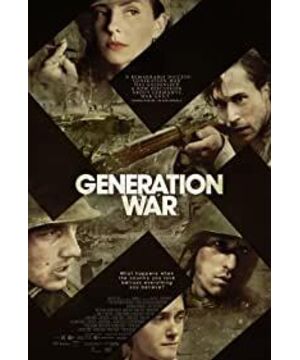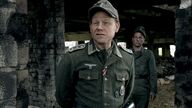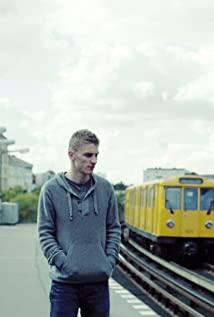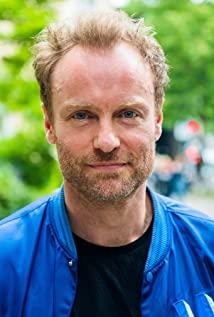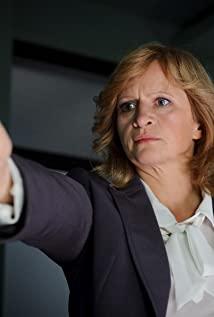I have seen some films about World War II before, such as "Life is Beautiful", "Grave of Fireflies", "The Boy in the Striped Pajamas", "Life and Death" and so on. Some show the harm caused to civilians by the frenzied war. Unarmed civilians are displaced, thousands of families are torn apart, and innocent lives are in vain. Some people tell the tragedy of German military officers who slaughtered Jews in cold blood. Their children strayed into the gas chamber because of play and died in the crematorium; some reflected on the "evil of banality" and discussed the responsibility of the "screw" who was forced to commit crimes in a sinful era and regime. . Each film is shocking, making people feel the cruelty and madness of war, and each film stirs the audience's inner emotions, prompting us to reflect on the nature of human nature and the source of war.
But this one is unique. First of all, its narrative perspective is an ordinary surviving deserter in the country where the war started. With the support of the crew's ten years of detailed historical research, the self-examination from the defeated country is more introspective than the speculation and simulation of others. . Second, its narrative style is more calm and restrained than other war movies, which means the pursuit of objectivity. In fact, the naked truth is indeed far more direct to the heart than the deliberate sensationalism. Third, it was ambitious, trying to show the trauma of the war on a generation of Germans in the form of a 270-minute extended film. The five protagonists of the fathers of contemporary Germans have different identities, personalities, and ideals, but the similarities are that the war completely changed their lives, not for the better, but for the worse, leaving an indelible mark imprint. Here, we see the profound helplessness of a generation kidnapped by the times.
The story begins a few days before the German invasion of the Soviet Union in 1941, when five playmates who grew up in a neighborhood gather in a bistro in Berlin for a small party for Wilham, Frederick Tom and Charlotte see off. Greta has a graceful figure and a sweet voice. She is in love with Victor, a Jewish boy, and she wants to be an actress. Wilham and Fredham are brothers who are about to go to the front to fight in the war. Charlotte passed the nursing exam and will also go to the battlefield hospital to save the wounded. She and her elder brother Wilham adored each other, but they never pierced the window paper. At this time, the five friends laughed, sang and danced, and every cell in their body was full of infinite possibilities of youth. They are not worried about the coming war in the slightest, but worship the Führer, believe in the Nazis, and think that this "war to liberate the world" will soon end (except for Fredham), and they meet in a few months. Christmas reunion here.
But the war wasn't what they imagined it to be, says Wilham, the film's narrator: "We were five friends when we were young and thought the future was ours and the whole world lay before us. As long as we act, we are invincible; later we gradually learned more."
As the "quick fight" dream was shattered, the battle lines became longer and longer. "Most people think that war is made up of hard work, but it's not. It's waiting, waiting for the next attack, waiting for the next meal, waiting for tomorrow." The more difficult it is, the more frightening is that the psychological defense line begins to collapse. Witnessing the Jews, who were also alive, being shot to death in front of their eyes, and obeying the order had to dye their hands with blood to execute the captured Soviet soldiers, I asked myself: What is the point of this war? Are you really doing an honorable and just cause? "Three years ago, when we started fighting the East, what we thought was to save our people, we are now bringing death, suffering and destruction to millions of innocent people."
Brother Wilham was a soldier with a sense of honor before going to the battlefield. He was burdened with his father's expectation of becoming a hero on the battlefield, and the responsibility of taking care of his younger brother entrusted by his mother before leaving. He has a sense of mission to fight for the motherland in his chest, and is convinced that it is a soldier's duty to lead a small team of soldiers well and complete each combat mission well. He is an excellent lieutenant, with a strong sense of responsibility, courage and resourcefulness, he takes good care of his soldiers, and takes great pains to protect his younger brother who is unwilling to participate in the war, but he silently bears a lot. But later, young comrades fell one after another, and innocent civilians were slaughtered. The reality challenged the bottom line of one's conscience again and again (for example, the Soviet civilians were forced to act as vanguards, exploring the way and stepping on landmines) until - before you knew it. You find that you can no longer touch your conscience, that you have become part of the "killing machine" of war, and a wave of despair floods your heart... "At first we fought for the motherland, but then we began to doubt this, and we fought for our comrades. In war, we can’t leave our comrades behind. But if all our comrades die, what should we do? You’re the only one left, and you can’t deceive yourself, so who else can you fight for?” Later, a surprise attack Failed and survived, Wilham chose to become a deserter. Soon, he was captured by the Nazis, put into a probation camp, forced to go deep into the danger of war, survived all kinds of inhuman treatment, and survived.
If we can see the inner struggle of an ordinary German soldier from his brother Wilham, then his lover Charlotte allows us to see the young German women full of national honor during the war. When she appeared, she braided two pigtails and excitedly told Greta that she had passed the nursing exam and could go to the front line to work as an ambulance. At this time, Charlotte, with her clear eyes full of pride in serving her country and an incomparably rippling spring heart, she loved the Third Reich so innocently and Wilham so shyly, and rushed to the front line. Then you can have both, so Greta was very happy for her when she heard the news. However, when she first entered the operating room and saw blood in her eyes, Charlotte really realized how unbearable reality was, and was so frightened that she shivered and dropped the scalpel that was supposed to be handed to the doctor. Later, she denounced the Jewish nurse Lilia out of patriotism, and went to warn Lilia to escape out of her kindness. The seemingly contradictory behavior revealed Charlotte's pure and beautiful heart. But war is used to destroy everything that is beautiful. At the end of the first episode, the news of Wilham's death came, and the disheartened Charlotte sold herself to the doctor and completely gave up thinking about Wilham. Later, out of pity, she secretly helped the wounded soldiers to extend the treatment and vacation time. Out of friendship with her companions, she ran back to the hospital to find the little Soviet nurse despite the retreat order, and was finally raped by the Soviet soldiers. Is it possible to find a way out by maintaining good character? The frenzied war and the era of right and wrong will only use infinite evil to swallow up the remaining good, and the struggle of ordinary people seems so pale and powerless in front of this huge monster.
Let's talk about Greta and Victor.
Greta is the most "self-righteous" of the five, who doesn't care about world affairs. Relatively speaking, she is selfish, immersed in her star dream, and she never seems to think that this world war has anything to do with her. Compared with Charlotte's simplicity and purity, Greta exudes the mature air of a dusty woman. She knows how to attract the attention of Nazi officers and how to use powerful people to achieve her goals, such as getting Jewish boyfriends. A pass or open up a career path for yourself. Although these are not from her original heart, but implied a lot of helplessness, pain and bitterness, she always thought that if she wanted, she would be able to do everything. From the beginning to the end, she looked at others and the world with cold eyes, and there was a faint arrogance in her chest. But in the face of the cruel reality, Greta's self-confidence collapsed across the board, she was still too young and too naive. Until the end, she did not know that although the Nazi officer had obtained Victor's pass, he still secretly arrested him and sent him to the train bound for the concentration camp. She was pregnant with a child, thinking that it would be a shield that would impress the Nazi officer and exonerate her, but what she did not expect was a heavy punch from the cold-blooded man towards her stomach. Before Greta was executed, the officers visited her in prison, just because Greta still had utility and could provide proof of her exoneration after the defeat. After being rejected by Greta, he showed a vicious face again, and the evil of human nature far exceeded Greta's imagination.
Victor's Jewish identity made him doomed to be a victim in this era, not to mention his independent and stubborn character. His life in Germany was difficult, unable to have a normal job and love. After the war broke out, he was keenly aware of the impending misfortune, and tried to get out of this dangerous country, but lost his beloved girlfriend forever. Even if he desperately escaped from the train bound for the concentration camp and accidentally became a member of the Polish partisans, he could only live in silence to hide his Jewish identity, because the Polish partisans also rejected Jews. But Victor was lucky, he met a Polish girl who was also Jewish, a farmer who kindly provided food, and finally let his partisan captain go because he couldn't bear it, and was even slapped by Fredham on the battlefield. Save... Such a coincidence is unbelievable, maybe the screenwriter couldn't bear to bring too much grief to the audience, so that Victor lived to the end. In reality, how many people can be blessed by fate? There is no savior in any link, and there is only death waiting for Victor, which is also the end of most Jewish refugees.
Finally, I want to talk about my favorite brother: Fredham.
He is a sensitive, timid, and individualistic young man of literature and art. He likes to read Rimbaud's poetry and Jung's theories. He has been opposed to the Nazis and war from the very beginning, and is reluctant to go into battle to kill the enemy. He clearly realizes that "war only Brings out the worst in people." After entering the battlefield, he would question the correctness of his brother's shooting of Soviet prisoners, deliberately lit cigarettes in the trenches to attract bombardment by enemy planes, and contradicted the superior in order to save a Jewish girl he did not know. At the beginning of the war, Fredham always stood by his inner conscience and never did anything against his values. Until his brother fell down in front of him in a battle, and when he returned home injured, he was ridiculed by his father and the German people... The light in his eyes slowly disappeared, and he turned into a mechanical killing machine that performed higher-level tasks. He could shoot prisoners of war without hesitation, execute civilians with a deadpan expression, and execute any order of his superiors without hesitation. But every drop of blood stained on his hands slowly accumulated into an unbearable sin and burden for Fredham, and finally overwhelmed the child who had hidden "Demian" in his schoolbag and brought it to the battlefield at the end of the war. He silently wrote the mailing address on the back of the photos of the five friends and entrusted it to his old comrades. He picked up his gun and rushed forward in despair.
When I first started watching it, I didn't like my brother at all, I thought he was not a man, he was bloodless, he was withdrawn everywhere on the battlefield, and he was a coward. But as the plot progresses, the younger brother's personality is revealed little by little. With the characteristics of a literary youth, he is certainly not comparable to his brother's courage, strength and responsibility, but he undoubtedly loves reading and knows what he is doing better than anyone else. He knows the war better than the other four friends, and his tragic ending is also very idealistic. In the later documentary, the other four can find the prototype, but there is no corresponding party for the character, experience and ending of the younger brother. Therefore, the younger brother is more like a very literary character created by the screenwriter by combining countless ordinary soldiers who were forced to participate in the war, coupled with the imagination of the concept of art redeeming the soul. He is not only the helplessness of being coerced by the times, but also the hope of human beings to find a way out.
The film's presentation of the five main characters is very objective. They are both sublime and selfish, excited and confused. As the audience, we can follow the joys and sorrows of the characters and the changes in circumstances, and experience the most real human nature and the most cruel choices in the war era. When we empathize with these five concrete and vivid lives, the evil of war is no longer an abstract symbol or concept for us, nor is it the pain of strangers far away from us, but a near-immediate, A terrifying existence within reach. Of course, seeing the micro-knowledge, these five characters not only represent the five individuals, but each also represents a group. The elder brother is a soldier who fights for honor, the younger brother is a soldier who is forced to fight, and Charlotte fights for love. Female, Greta lives for herself regardless of the war, and Victor is a persecuted Jew. Without exception, as the ordinary people of the country that initiated the war, they are also victims of the war. This history, full of absurdities, drove a generation of German youths to shed their youthful blood for illusory goals. However, all their hard work became victims of lies. They finally found out that they were actually accomplices of evil, and their lives had long been ruined.
However, the strength of reflection in this film is more than that. The exposed truth is more powerful than deliberate sensationalism, and it can often accommodate richer details of life and present the essence of the problem. There is no doubt about the tragedy and trauma caused by the war. What caused all this? Hitler? Nazi? Fascist? Of course they are. However, blaming one demonized villain or organization and shunning oneself is an act that lacks reflective sincerity and simplifies complex reality. Fredham said at the very beginning: "War will only bring out the worst side of people." Lot betrayed Lilia, who had helped him, Greta clings to Nazi officers to achieve star dreams... They are not the main criminals of war, but they have become accomplices of evil intentionally or unintentionally. It is difficult for individuals to live in a totalitarian oppression. To maintain independence and conscience in a society where the world is turbid, the worst side of everyone's human nature makes this already devastated world even darker.
At the end of the film, Martin, the sinister Nazi officer, was sheltered by the Allies, and he had a decent job and position after the war, and became prosperous. In this regard, the explanation in the documentary is that Germany is difficult to rebuild after the war, and there is not enough "clean water", so it can only use "sewage", so that they can coexist in this wasteland country. The remnants of the wicked are still there, just as the evil side of human nature cannot be eliminated after all. We hope that this will not happen again, but how to avoid repeating the same mistakes is still a serious problem.
Fortunately, the light in the hearts of people with pure nature will never die, both in the film and in reality. It is not easy to come out of the ruins and shadows of the old world, to rethink everything in the past, and to craft such a masterpiece of World War II film. The suffering and humiliation of the father's generation is the wealth of future generations. I hope that "taking history as a mirror" can really prevent the tragedy from repeating itself.
View more about Generation War reviews


